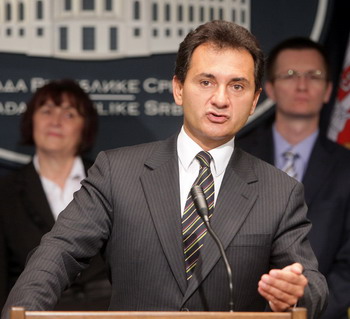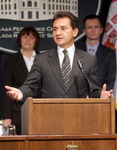- Serbia
Get to know Serbia
- Citizens
Culture and science
Health services
Pension and disability insurance
- Business
Employment
Economy
- Media
- Government
- Contact
Keep in touch
Contact form
Back
Keepin touch
Whether you have a question, comment, suggestion or any problem in the purview of the government, send us your message and we will try to respond as soon as possible. If your problem is not in our purview, we will forward your message to the relevant institution.
Q:
A:
Programme of public debate on Draft law on restitution, indemnification adopted
Belgrade,
29 July 2011
Deputy Prime Minister for European Integration Bozidar Djelic said that at today’s extraordinary session of the government Committee for Economy and Finances, a programme of public debate on the Draft law on restitution and indemnification was adopted.
Djelic said at a press conference held after the session that objections to this programme can be made by the end of August through the websites of the Serbian government and the Ministry of Finance.
He added that public debates will be held in several towns in Serbia.
This law, which will allow Serbia to be recognised as a country that respects human rights, should be adopted in the Serbian Parliament in September under regular procedure.
Djelic underlined that with the adoption of this law our country will amend a grave injustice that was committed after World War II, but will also fulfil an important condition for obtaining EU candidate status.
The priority will be restitution in kind, Djelic said and explained that in cases where this is not possible the state will pay compensation through state bonds.
On 1 January 2015 Serbia will issue state bonds to the amount of RSD 200 billion, which equals €2 billion, with a repayment period of 20 years, Djelic announced.
He explained that there are two ways to issue bonds – first as inflation protected dinar bonds, and second as bonds linked to the euro, which will be issued in the same way as old foreign currency savings bonds.
The Deputy Prime Minister explained that the law is designed in such a way as not to jeopardise the financial stability of the state and that the issued bonds will make up between 6% and 7% of Serbia’s GDP.
The amount of the effective compensation will be known in late 2014, he said and added that the Law on restitution and indemnification will not inflict new injustice and the rights of current owners will be respected.
Djelic underlined that the subject of restitution will be all property seized after World War II, excluding the royal compound in Dedinje, the buildings in which important state institutions are placed and museums.
The Deputy Prime Minister pointed out that those who claim property, and of whom there are more than 150,000 according to estimates, will have up to two years to apply for restitution.
Heirs of the members of the occupying forces will not be entitled to restitution, except for the heirs of rehabilitated persons.
Property will be returned to foreign nationals in line with the reciprocity principle, which means that if Serbian citizens cannot exercise this right in another country, then nationals from these countries will also be unable to exercise the same right to restitution in Serbia, he explained.
Djelic noted that the owners will be able to get an advance of 10% of the value of the property in cash, while the poorest owners will get up to 50% of the value of their property.
Serbia has €130 million from privatisation processes on its account and this money will be used for advance payments, whose maximum amount will be €10,000, Djelic said.
Once the law is adopted, no one will be able to claim nationalised property that is now state owned, and especially the one in a privatisation process, Djelic concluded.
He added that public debates will be held in several towns in Serbia.
This law, which will allow Serbia to be recognised as a country that respects human rights, should be adopted in the Serbian Parliament in September under regular procedure.
Djelic underlined that with the adoption of this law our country will amend a grave injustice that was committed after World War II, but will also fulfil an important condition for obtaining EU candidate status.
The priority will be restitution in kind, Djelic said and explained that in cases where this is not possible the state will pay compensation through state bonds.
On 1 January 2015 Serbia will issue state bonds to the amount of RSD 200 billion, which equals €2 billion, with a repayment period of 20 years, Djelic announced.
He explained that there are two ways to issue bonds – first as inflation protected dinar bonds, and second as bonds linked to the euro, which will be issued in the same way as old foreign currency savings bonds.
The Deputy Prime Minister explained that the law is designed in such a way as not to jeopardise the financial stability of the state and that the issued bonds will make up between 6% and 7% of Serbia’s GDP.
The amount of the effective compensation will be known in late 2014, he said and added that the Law on restitution and indemnification will not inflict new injustice and the rights of current owners will be respected.
Djelic underlined that the subject of restitution will be all property seized after World War II, excluding the royal compound in Dedinje, the buildings in which important state institutions are placed and museums.
The Deputy Prime Minister pointed out that those who claim property, and of whom there are more than 150,000 according to estimates, will have up to two years to apply for restitution.
Heirs of the members of the occupying forces will not be entitled to restitution, except for the heirs of rehabilitated persons.
Property will be returned to foreign nationals in line with the reciprocity principle, which means that if Serbian citizens cannot exercise this right in another country, then nationals from these countries will also be unable to exercise the same right to restitution in Serbia, he explained.
Djelic noted that the owners will be able to get an advance of 10% of the value of the property in cash, while the poorest owners will get up to 50% of the value of their property.
Serbia has €130 million from privatisation processes on its account and this money will be used for advance payments, whose maximum amount will be €10,000, Djelic said.
Once the law is adopted, no one will be able to claim nationalised property that is now state owned, and especially the one in a privatisation process, Djelic concluded.
-
 Belgrade, 22 January 2025
Belgrade, 22 January 2025Egypt one of Serbia’s closest partners on international stage
-
 Belgrade, 9 July 2024
Belgrade, 9 July 2024Support for 104 associations in diaspora that preserve Serbian language, culture
-
 Belgrade, 15 April 2024
Belgrade, 15 April 2024Competition for StarTech grants open until 31 May
-
 Belgrade, 2 October 2023
Belgrade, 2 October 2023Serbia respects Resolution 1244 and will do everything to preserve peace
-
 Belgrade, 13 September 2023
Belgrade, 13 September 2023Day of Serbian Unity to be celebrated outside borders of Serbia, Republika Srpska for the first time
-
 Belgrade, 8 August 2023
Belgrade, 8 August 2023RSD 24.2m in state aid paid out to citizens affected by storm
-
 Belgrade, 17 June 2023
Belgrade, 17 June 2023Belgrade is doing everything to preserve peace in Kosovo and Metohija
-
 Belgrade, 15 June 2023
Belgrade, 15 June 2023Slovenia will continue to support Serbia on its way to EU
-
 Belgrade, 5 May 2023
Belgrade, 5 May 2023Emergency measures, tightening of conditions for possessing weapons
-
 Belgrade, 3 May 2023
Belgrade, 3 May 2023Three days of mourning in Serbia over tragedy at Vladislav Ribnikar primary school


